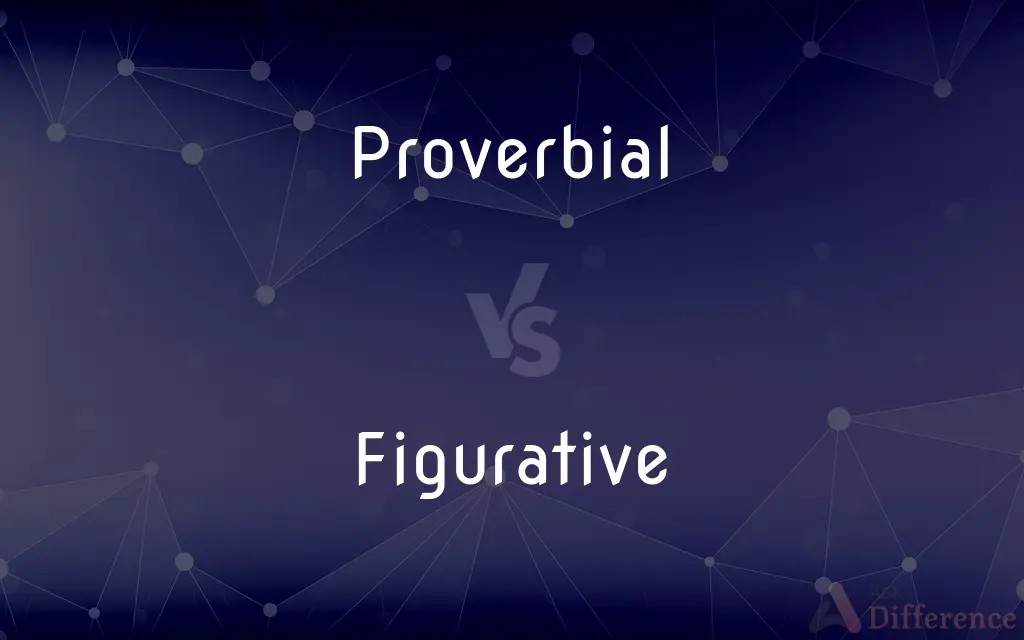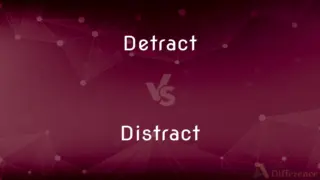Proverbial vs. Figurative — What's the Difference?
By Maham Liaqat & Fiza Rafique — Updated on April 23, 2024
Proverbial refers to expressions widely used to illustrate common truths or beliefs; figurative language involves using words or phrases with a symbolic meaning different from their literal interpretation.

Difference Between Proverbial and Figurative
Table of Contents
ADVERTISEMENT
Key Differences
Proverbial expressions derive from proverbs, which are traditional sayings that convey moral lessons or truths, such as "a stitch in time saves nine." In contrast, figurative language includes metaphors, similes, personification, and more, used to enrich language by conveying meanings beyond the literal words.
While the proverbial use of language directly invokes the wisdom or commonly understood meaning associated with a proverb, figurative language generally employs creative linguistic techniques to evoke imagery, offer comparisons, or express ideas in non-literal ways.
Proverbial expressions are often fixed and widely recognized within a culture, making them readily understood by those familiar with the sayings. On the other hand, figurative expressions can be original or tailored, requiring interpretation and a deeper understanding of context to grasp their intended meaning.
The use of proverbial phrases often serves to reinforce cultural norms and shared values, as they are rooted in longstanding traditions and collective experiences. Conversely, figurative language primarily enhances artistic and rhetorical expression, providing a dynamic way to capture attention and engage emotions.
Both proverbial and figurative language enrich communication by layering additional meaning and context, but they do so in fundamentally different ways, reflecting either cultural continuity or creative interpretation.
ADVERTISEMENT
Comparison Chart
Definition
Relating to or resembling a proverb
Using words outside their literal meaning
Usage
Conveys common truths or advice
Enhances expression, evokes imagery
Examples
"An apple a day keeps the doctor away."
"Time is a thief."
Nature
Fixed, traditional
Creative, varied
Communication Purpose
Reinforce cultural values
Artistic, emotional engagement
Compare with Definitions
Proverbial
Reflecting a phrase or idea that has become a stereotype or cliché.
She faced the proverbial fork in the road when deciding her career path.
Figurative
Used to create vivid imagery or express something in a non-literal way.
The world is your oyster.
Proverbial
Symbolic of something that is well-known or typical.
The deserted office during the holidays was the proverbial ghost town.
Figurative
Enhancing writing by invoking sensory or conceptual connections.
The words cut deeper than a knife.
Proverbial
Pertaining to a proverb, embodying the form or spirit of a traditional saying.
His arrival was the proverbial calm before the storm.
Figurative
Departing from a literal use of words; metaphorical.
He drowned in a sea of grief.
Proverbial
Widely known or recognized, often used to summarize common wisdom.
Her knack for timely advice was proverbial.
Figurative
Employing figures of speech like similes and metaphors.
Her smile was a bright sun in the dreary meeting.
Proverbial
Using expressions that convey truths through traditional wisdom.
He is the proverbial early bird, always starting his day at dawn.
Figurative
Involving a symbolic representation of ideas or attributes.
The curtain of night fell upon us.
Proverbial
(of a word or phrase) referred to in a proverb or idiom
I'm going to stick out like the proverbial sore thumb
Figurative
Departing from a literal use of words; metaphorical
A figurative expression
Proverbial
Used to stand for a word or phrase that is normally part of a proverb or idiom but is not actually uttered
One word out of line, and the proverbial hits the fan
Figurative
(of an artist or work of art) representing forms that are recognizably derived from life.
Proverbial
Of the nature of a proverb.
Figurative
Based on or making use of figures of speech; metaphorical
Figurative language.
Proverbial
Expressed in a proverb.
Figurative
Containing many figures of speech; ornate.
Proverbial
Widely referred to, as if the subject of a proverb; famous.
Figurative
Represented by a figure or resemblance; symbolic or emblematic.
Proverbial
Of, resembling, or expressed as a proverb, cliché, fable, or fairy tale.
Figurative
Of or relating to artistic representation by means of animal or human figures.
Proverbial
Widely known; famous; stereotypical.
I grew up in a prefab house on Main Street in 1950s suburbia, the second and last child of a proverbial nuclear family.
Figurative
Of use as a metaphor, simile, metonym or other figure of speech, as opposed to literal; using figures; as when saying that someone who eats more than they should is a pig or like a pig.
Proverbial
(euphemistic) Used to replace a word that might be considered unacceptable in a particular situation, when using a well-known phrase.
I think we should be prepared in case the proverbial hits the fan.
Are you taking the proverbial?
Figurative
Metaphorically so called.
Proverbial
The groin or the testicles.
You'll find they've got you by the proverbials.
Figurative
With many figures of speech.
Proverbial
Mentioned or comprised in a proverb; used as a proverb; hence, commonly known; as, a proverbial expression; his meanness was proverbial.
In case of excesses, I take the German proverbial cure, by a hair of the same beast, to be the worst.
Figurative
Emblematic, symbolic; representative, exemplative
Proverbial
Of or pertaining to proverbs; resembling a proverb.
Figurative
(art) representing forms recognisable in life and clearly derived from real object sources, in contrast to abstract art.
Proverbial
Of or relating to or resembling or expressed in a proverb;
He kicked the proverbial bucket
The proverbial grasshopper
Figurative
Representing by a figure, or by resemblance; typical; representative.
This, they will say, was figurative, and served, by God's appointment, but for a time, to shadow out the true glory of a more divine sanctity.
Proverbial
Widely known and spoken of;
Her proverbial lateness
The proverbial absentiminded professor
Your proverbial dizzy blonde
Figurative
Used in a sense that is tropical, as a metaphor; not literal; - applied to words and expressions.
Figurative
Abounding in figures of speech; flowery; florid; as, a highly figurative description.
Figurative
(used of the meanings of words or text) not literal; using figures of speech;
Figurative language
Figurative
Consisting of or forming human or animal figures;
A figural design
The figurative art of the humanistic tradition
Common Curiosities
How does figurative language enhance communication?
Figurative language enhances communication by adding depth, evoking emotions, and creating vivid imagery, making ideas more engaging and memorable.
What are some examples of figurative language?
Examples include metaphors ("Life is a highway"), similes ("as brave as a lion"), personification ("The wind whispered"), and hyperbole ("I've told you a million times").
Why is proverbial language important in culture?
Proverbial language is important as it carries the wisdom of past generations, reinforces shared values, and promotes a sense of continuity within a culture.
How does one effectively use figurative language in writing?
Effectively using figurative language involves choosing figures of speech that enhance the meaning and emotional impact of the writing, tailored to the context and audience.
What does it mean when something is described as proverbial?
When something is described as proverbial, it refers to it being widely recognized and understood within the context of common sayings or traditional wisdom.
Can a phrase be both proverbial and figurative?
Yes, a phrase can be both proverbial and figurative if it uses a traditional saying in a way that also departs from literal meaning to convey a deeper or symbolic idea.
Can figurative language be confusing in communication?
Yes, if used excessively or without clear context, figurative language can be confusing or obscure the intended message.
What is the difference between proverbial wisdom and cliché?
Proverbial wisdom stems from traditional sayings with enduring truths, whereas a cliché is an overused phrase that often lacks originality or impact due to its frequent use.
Is figurative language used in formal writing?
Figurative language can be used in formal writing, but it should be applied carefully to ensure clarity and maintain the tone suitable for the audience and purpose.
How do proverbs differ culturally?
Proverbs differ culturally in their content and the values they reflect, shaped by the historical, social, and environmental context of the culture.
What role does figurative language play in literature?
In literature, figurative language plays a crucial role in setting tone, building character, and creating richer, more evocative narratives.
How can learning proverbial expressions aid in language learning?
Learning proverbial expressions can help language learners understand cultural nuances and improve their ability to communicate naturally and effectively.
How do children learn to understand figurative language?
Children learn to understand figurative language through exposure, context, and explanation, which help them grasp abstract and non-literal meanings.
What impact does the use of metaphors have in rhetoric?
The use of metaphors in rhetoric can powerfully influence an audience's perception and emotional response, often making arguments more persuasive.
Are idioms considered a form of figurative language?
Yes, idioms are a form of figurative language as they express meanings that are not directly deducible from the words used.
Share Your Discovery

Previous Comparison
Detract vs. Distract
Next Comparison
Master vs. MisterAuthor Spotlight
Written by
Maham LiaqatCo-written by
Fiza RafiqueFiza Rafique is a skilled content writer at AskDifference.com, where she meticulously refines and enhances written pieces. Drawing from her vast editorial expertise, Fiza ensures clarity, accuracy, and precision in every article. Passionate about language, she continually seeks to elevate the quality of content for readers worldwide.














































